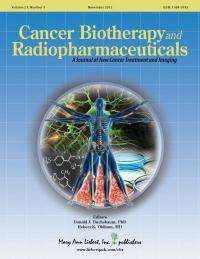©2012, Mary Ann Liebert, Inc., publishers
Radiolabeled agents are powerful tools for targeting and killing cancer cells and may help improve outcomes and lengthen survival times of patients with advanced disease that has spread beyond the initial tumor site. Effective therapy for metastatic cancer requires a combination of treatments, and the benefits of adding radionuclide therapy are explored in three studies published in Journal of Clinical Investigation.
"The preliminary therapeutic results reported in these case studies using radionuclide multimodality approaches are encouraging," says Co-Editor-in-Chief Donald J. Buchsbaum, PhD, Division of Radiation Biology, Department of Radiation Oncology, University of Alabama at Birmingham. "The outcomes described in these small, single center studies must be confirmed in larger trials before they can be translated into widespread oncology practice."
J. Harvey Turner, MD, FRACP, The University of Western Australia, Fremantle, coauthored two of the case studies and, in the Perspective article "Multimodality Radionuclide Therapy of Progressive Disseminated Lymphoma and Neuroendocrine Tumors as a Paradigm for Cancer Control," he states that the synergistic effects that can be achieved by combining chemotherapy and radionuclides "has the potential to enhance efficacy and minimize toxicity." Although advanced forms of lymphoma and neuroendocrine tumors are usually incurable, multimodal treatment approaches may be able to stop or slow tumor progression, achieve durable remission, prolong patient survival, and improve their quality of life.
Journal information: Journal of Clinical Investigation
Provided by Mary Ann Liebert, Inc


















